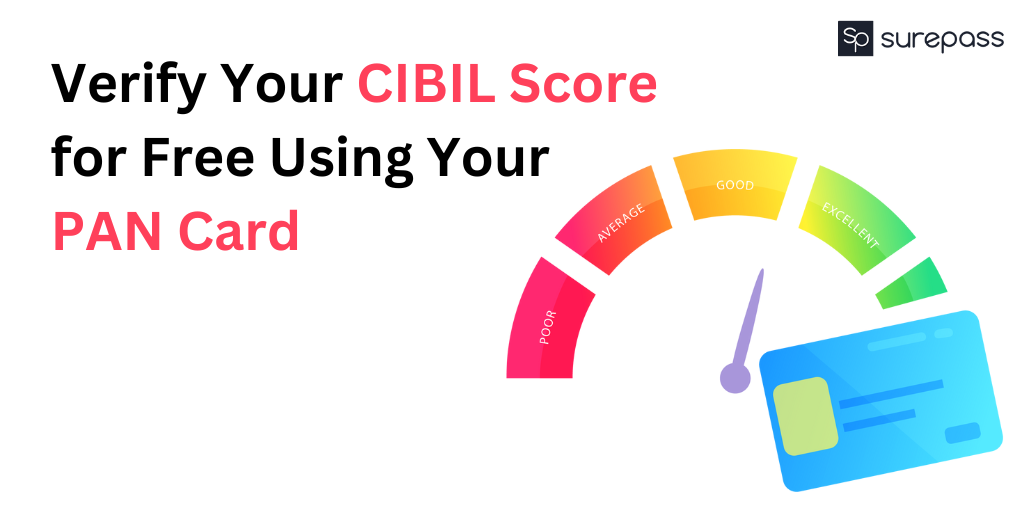
What is a CIBIL Score and Why is it Important?
A CIBIL score is a three-digit number that represents an individual’s creditworthiness based on their credit history. Financial institutions refer to this score to assess the risk involved in granting loans.
In simple terms, a CIBIL score is a three-digit number between 300 and 900 that determines the creditworthiness of the borrower based on his/her past repayment behaviour. A good CIBIL score, typically above 750, increases the chances of loan approval at favourable interest rates.
Why is PAN Card Important to Check CIBIL Score?
Every time you perform a financial transaction, it gets logged against your PAN number. Consequently, CIBIL uses your PAN number to aggregate all your financial transactions, such as loans, credit cards, etc. Hence, a PAN card or PAN number is important to check your CIBIL score.
Your PAN card details are required to check CIBIL score. Simply enter the required details, including the PAN card number, and submit to receive the complete credit report.
Steps to Check Your CIBIL Score with PAN Card for Free
You can visit the official website of CIBIL or check your credit score for free from verified lenders like Poonawalla Fincorp. Following are the steps to check your CIBIL score with a PAN Card:
- Step 1: Click on the ‘Free CIBIL Score’ button on Poonawalla Fincorp’s website.
- Step 2: Enter your name, mobile number, e-mail, address, and other details.
- Step 3: Enter your PAN Number and click on the “Submit” button.
Within a few seconds, your CIBIL score will be displayed on the screen. If you want a detailed report, click the “View Report” button. You will get a comprehensive list of all the credit facilities you have availed of to date, such as loans, credit cards, etc.
Benefits of Checking Your CIBIL Score Regularly
Regularly monitoring your CIBIL score offers several advantages, which include:
- Helping you stay informed about your credit health.
- Aiding in detecting errors or fraudulent activities.
- Ensuring that you take the necessary actions to rectify them.
- Allowing you to assess your eligibility for loans or credit cards.
- Helping you negotiate better interest rates.
- Planning your financial goals strategically.
- ALSO READ :- How CIBIL Score is Calculated? | A Step-by-Step Guide
CIBIL Score Range:
CIBIL scores fall within a range of 300 to 900. A score above 750 is generally considered good, while scores below 600 are considered unfavourable. It’s essential to maintain a healthy credit score to avail of credit facilities effortlessly and benefit from favourable terms.
A high CIBIL score enhances your chances of getting:
- Quicker Loan Approvals
- Favourable Interest Rates
- High Loan Amount
- Better Repayment Terms
The following table shows the indicative range for the CIBIL score. Please note that these ranges are only indicative, and not uniform among all lenders. The thumb rule to be followed is that the higher the CIBIL score, the better your chances of loan approval and good terms.
| CIBIL Score Range | Classification |
| 550 or below | Bad |
| Between 550 and 649 | Poor |
| Between 650 and 699 | Average |
| Between 700 and 749 | Good |
| Between 750 and 900 | Excellent |
How to Improve Your CIBIL Score:
Improving your CIBIL score is possible through certain diligent practices. Some steps that can help improve your score over time are as follows:
- Paying bills and monthly instalments on time
- Reducing credit card utilisation
- Keeping a check on credit enquiries
- Maintaining a balanced credit mix
- Avoiding frequent and unnecessary credit applications
CIBIL Score Requirements for Various Secured or Unsecured Loans
Different types of loans have specific CIBIL score requirements. For a secured loan like a Loan Against Property or a Second-hand Car Loan, a CIBIL score of 650 or above is generally preferred.
On the other hand, an unsecured loan like a Personal Loan or credit card may require a higher score, typically above 750, to get your lender’s approval.
To Conclude
Checking your CIBIL score regularly through your PAN card is vital for maintaining a healthy credit profile. It enables you to monitor your creditworthiness, address potential discrepancies, and take necessary steps to improve CIBIL Score. Stay proactive in managing your credit, as a favourable CIBIL score opens doors to various financial opportunities and ensures smooth access to credit facilities.
Frequently Asked Questions About CIBIL Score
1. Can I check my CIBIL score online for free?
Yes, you can check your CIBIL score for free through various credit rating agencies and the official CIBIL website by using your PAN card details. You can also check your credit score in just a few steps from accredited and verified lending institutions like Poonawalla Fincorp.
2. Is CIBIL based on a PAN card?
Since all your financial transactions are reflected in your PAN number, it is essential to enter your PAN number to get your CIBIL score.
3. How to find the exact CIBIL Score?
Follow the steps mentioned above in the section – “Steps to check CIBIL score by PAN Card”
4. How often should I check my CIBIL score?
It is recommended to check your CIBIL score at least once a year, or before applying for a loan or credit card. Doing so ensures accuracy and helps identify any potential issues.
5. Will checking my CIBIL score frequently affect it negatively?
No, checking your own CIBIL score does not impact your credit score. It is considered a “soft inquiry” and does not leave any negative impact on your credit profile.
Courtsey To : Bankbazaar









Average Rating